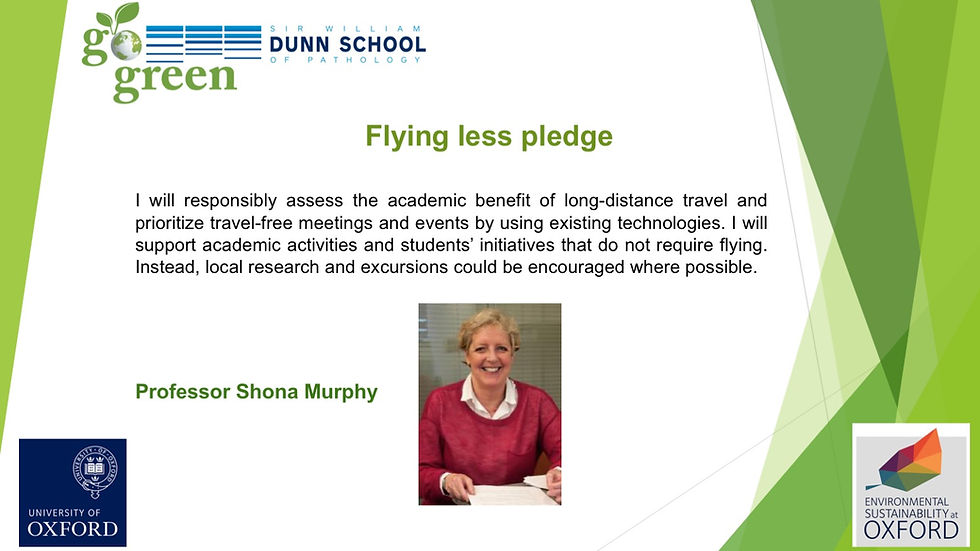Sustainable Conferences: Reducing the Carbon Footprint of Biological Research Events
Why It Matters
Conferences are an essential part of scientific progress, enabling collaboration, knowledge exchange, and career development. However, the carbon footprint of academic travel—especially flights—can be significant. At the Dunn School Green Group, we are committed to reducing the environmental impact of research activities, including how we engage with scientific meetings.
What’s the Problem?
Air travel is often the largest contributor to an academic’s personal carbon footprint. A single return flight from London to Boston emits around 1.5 tonnes of CO₂ per person—more than the UK average for heating a home for an entire year.
Even short-haul flights add up. For example, a return economy flight from London to Alicante, Spain generates approximately 600 kg of CO₂ per person. That’s equivalent to the electricity used by an average UK household over two months.
In-person conferences also generate emissions from venue energy use, catering, printed materials, and waste. As a department committed to sustainable research, we believe we can do better.
What We Can Do
1. Rethink How We Attend
-
Prioritise virtual or hybrid meetings when they can achieve the same goals without travel
-
Choose low-carbon transport for regional or European events—trains can cut emissions by up to 90% compared to flying
-
Travel smart: bundle multiple meetings into one trip, or extend travel to avoid multiple flights
2. Select Conferences That Value Sustainability
-
Support conferences that offer hybrid participation, carbon tracking, or offsetting schemes
-
Advocate for sustainability in conference planning, including plant-based catering, digital programmes, and green venues
3. Lead by Example at Oxford
-
Encourage local and departmental symposia to be low-carbon by design—e.g. regional speaker panels, Zoom accessibility, or train-only travel policies
-
Offer lab-level carbon budgets to guide travel decisions
-
Highlight and reward low-carbon travel in group communications and funding applications
The Dunn School Fly Less Commitment
Several Dunn School Principal Investigators have signed Fly Less Pledges, committing to reduce the frequency of academic flights. Where possible, PIs are opting to attend virtually—or delegating in-person conference attendance to postdocs and DPhil students. This provides both career development opportunities and lower-carbon alternatives. This initiative empowers the next generation of scientists while actively reducing the department’s air travel footprint.
Calculate Your Event Carbon Footprint
To support better planning, we recommend using the Event Carbon Calculator developed by The Company of Biologists. This free tool estimates the emissions generated by academic events—from travel and accommodation to catering and venue energy—and suggests ways to reduce them.
What We're Doing at the Dunn School
-
Promoting train travel as the default for conferences in the UK and near Europe
-
Supporting remote attendance of international meetings with departmental funding and IT infrastructure
-
Working with the University Sustainability Team to measure and reduce the travel footprint of research
-
Including conference emissions in LEAF criteria discussions across our labs
-
Championing the Fly Less Pledge at PI and lab level
How You Can Help
-
Reflect on whether travel is essential for each event
-
Use the Event Carbon Calculator to benchmark and reduce your conference emissions
-
Join us in planning sustainable seminars and green research meetings
-
Share ideas and success stories—whether it's cycling to a conference or hosting a lab retreat via Zoom
Let’s keep science global, but make the footprint local.




